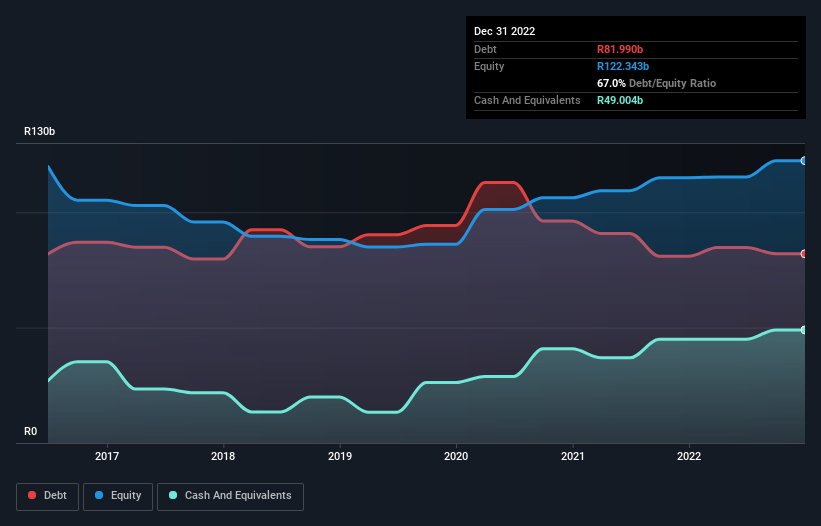
Howard Marks put it nicely when he said that, rather than worrying about share price volatility, 'The possibility of permanent loss is the risk I worry about... and every practical investor I know worries about.' So it might be obvious that you need to consider debt, when you think about how risky any given stock is, because too much debt can sink a company. We can see that MTN Group Limited (JSE:MTN) does use debt in its business. But should shareholders be worried about its use of debt?
When Is Debt A Problem?
Generally speaking, debt only becomes a real problem when a company can't easily pay it off, either by raising capital or with its own cash flow. If things get really bad, the lenders can take control of the business. However, a more frequent (but still costly) occurrence is where a company must issue shares at bargain-basement prices, permanently diluting shareholders, just to shore up its balance sheet. By replacing dilution, though, debt can be an extremely good tool for businesses that need capital to invest in growth at high rates of return. The first step when considering a company's debt levels is to consider its cash and debt together.
See our latest analysis for MTN Group
What Is MTN Group's Net Debt?
The chart below, which you can click on for greater detail, shows that MTN Group had R82.0b in debt in December 2022; about the same as the year before. However, it also had R49.0b in cash, and so its net debt is R33.0b.

A Look At MTN Group's Liabilities
We can see from the most recent balance sheet that MTN Group had liabilities of R143.0b falling due within a year, and liabilities of R126.6b due beyond that. Offsetting these obligations, it had cash of R49.0b as well as receivables valued at R29.4b due within 12 months. So it has liabilities totalling R191.1b more than its cash and near-term receivables, combined.
This is a mountain of leverage even relative to its gargantuan market capitalization of R211.2b. This suggests shareholders would be heavily diluted if the company needed to shore up its balance sheet in a hurry.
In order to size up a company's debt relative to its earnings, we calculate its net debt divided by its earnings before interest, tax, depreciation, and amortization (EBITDA) and its earnings before interest and tax (EBIT) divided by its interest expense (its interest cover). The advantage of this approach is that we take into account both the absolute quantum of debt (with net debt to EBITDA) and the actual interest expenses associated with that debt (with its interest cover ratio).
While MTN Group's low debt to EBITDA ratio of 0.38 suggests only modest use of debt, the fact that EBIT only covered the interest expense by 5.1 times last year does give us pause. But the interest payments are certainly sufficient to have us thinking about how affordable its debt is. We note that MTN Group grew its EBIT by 24% in the last year, and that should make it easier to pay down debt, going forward. There's no doubt that we learn most about debt from the balance sheet. But ultimately the future profitability of the business will decide if MTN Group can strengthen its balance sheet over time. So if you want to see what the professionals think, you might find this free report on analyst profit forecasts to be interesting.
But our final consideration is also important, because a company cannot pay debt with paper profits; it needs cold hard cash. So it's worth checking how much of that EBIT is backed by free cash flow. During the last three years, MTN Group produced sturdy free cash flow equating to 51% of its EBIT, about what we'd expect. This cold hard cash means it can reduce its debt when it wants to.
Our View
MTN Group's net debt to EBITDA was a real positive on this analysis, as was its EBIT growth rate. On the other hand, its level of total liabilities makes us a little less comfortable about its debt. When we consider all the factors mentioned above, we do feel a bit cautious about MTN Group's use of debt. While debt does have its upside in higher potential returns, we think shareholders should definitely consider how debt levels might make the stock more risky. The balance sheet is clearly the area to focus on when you are analysing debt. However, not all investment risk resides within the balance sheet - far from it. For instance, we've identified 1 warning sign for MTN Group that you should be aware of.
Of course, if you're the type of investor who prefers buying stocks without the burden of debt, then don't hesitate to discover our exclusive list of net cash growth stocks, today.
New: Manage All Your Stock Portfolios in One Place
We've created the ultimate portfolio companion for stock investors, and it's free.
• Connect an unlimited number of Portfolios and see your total in one currency
• Be alerted to new Warning Signs or Risks via email or mobile
• Track the Fair Value of your stocks
Have feedback on this article? Concerned about the content? Get in touch with us directly. Alternatively, email editorial-team (at) simplywallst.com.
This article by Simply Wall St is general in nature. We provide commentary based on historical data and analyst forecasts only using an unbiased methodology and our articles are not intended to be financial advice. It does not constitute a recommendation to buy or sell any stock, and does not take account of your objectives, or your financial situation. We aim to bring you long-term focused analysis driven by fundamental data. Note that our analysis may not factor in the latest price-sensitive company announcements or qualitative material. Simply Wall St has no position in any stocks mentioned.
About JSE:MTN
MTN Group
Provides mobile telecommunications services in South Africa, Nigeria, South and East Africa, West and Central Africa, and the Middle East and North Africa.
Undervalued with reasonable growth potential.
Similar Companies
Market Insights
Community Narratives



